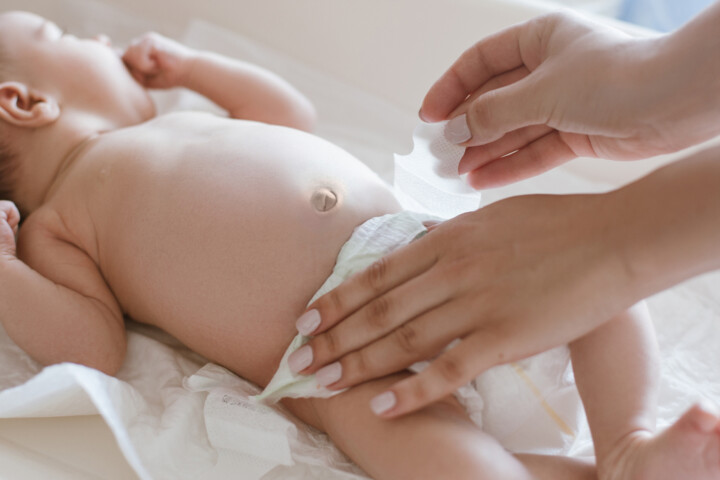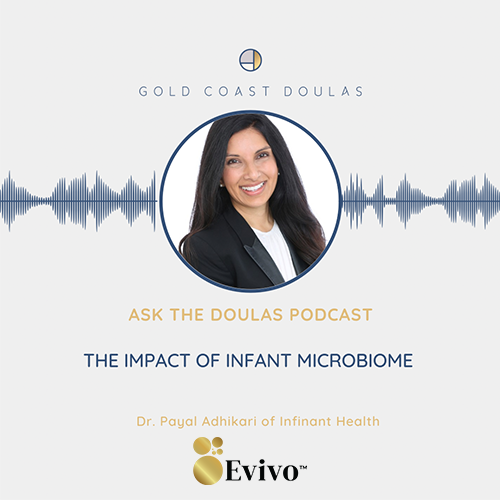The Surprising Information You Can Learn from Your Baby’s Poop

By: Dr. Erin Qualter
Neonatologist, Clinical Implementation Director
Incorporating a tiny human into your life is ALOT for new parents, even with adequate support from family and friends. You are likely looking for answers to many questions you never anticipated asking. Every time you have a free moment, you may find yourself getting lost down an online search rabbit hole, and your search history is probably full of phrases like: “How many hours should my baby be sleeping?” and “What is a normal amount of spit up?”
Guess what? New parents worry. They ask a lot of questions. They want to ensure their baby is healthy, eating enough, developing, and happy. So, if you are seeking information about your baby 24/7, know that you are doing great and you are not alone.
One of the reasons parents often struggle during the first few months is tummy trouble. Gas, colic, fussiness, and diaper rash plague many new families, often leading to sleepless nights and frustration. If you are in the thick of it right now, there is a surprising way to learn what is causing your baby’s discomfort.
Poop is a window into baby gut health
We now know that many common newborn issues can be linked to imbalances in baby’s gut. When there is too much bad bacteria and not enough of the good guys, baby’s stool pH becomes elevated. And that dirty diaper may contain some valuable information. Your baby’s stool provides a window into her gut health that can help you get to the bottom of gas, colic, fussiness, and diaper rash.
Parents who want answers can now purchase a simple test that measures the microbes in your baby’s gut from your baby’s stool. One such test, available from an organization called Tiny Health, can help determine if your newborn has any gut imbalances, by showing you what percent of friendly, and unfriendly microbes your baby has in their gut and even how proficient those gut microbes might be at important functions based off their gene content.
You’ll be able to see:
- Their ability to digest breast milk (Human Milk Oligosaccharides “HMOs” digestion capacity)
- Antibiotic resistance (do they have microbes that are resistant to antibiotics)
- C-section signature (babies guts with less beneficial bacteria – even non C-section babies can have this)
- Their immune health ((which is closely related to how much B. infantis bacterium they have in their system)
- And more…
Use code EVIVO20 for $20 off a Tiny Health Baby Gut Health Test
Even without testing, parents should know a recent study shows that 90% of babies are missing the key beneficial species, B. infantis.1 This beneficial species should be abundant in your baby’s gut during the early stages of life since they train your baby’s immune system2 as well as keep unfriendly species in check. If your baby is fussy, gassy or experiencing diaper rash, these are good indicators that good bacteria may be missing.
What should you do if your baby has gut imbalances or is missing key good bacteria?
Research shows that a daily feeding of the specific strain of good bacteria in Evivo baby probiotic, B. infantis EVC001, can improve microbiome composition and lower infant stool pH to the recommended range. Why? Because Evivo is clinically shown to increase the beneficial bacteria in the gut, and creating a protective environment that resolves the root cause of tummy troubles. If you are currently consumed by difficult newborn days (and nights), breathe a sigh of relief. It does not have to be this way. Evivo can help.
If you want to learn more about your baby’s gut microbiome, you’ll find a lot of useful information on our website. Plus, talk to your pediatrician about stool pH, gut health, and how to get started with Evivo.
Hang in there. Life is about to get a whole lot easier. You’ve got this!
About the Author
Erin Qualter, MD, Neonatologist
Dr. Qualter is a neonatologist who cares for babies at Monmouth Medical Center in Long Branch, New Jersey. Her passion lies in caring for infants, optimizing their care and outcomes through the best nutrition options. She received a Master’s in nursing from Columbia University, where she was a Clinical Research Nurse Practitioner at the Children’s Hospital of New York-Presbyterian at Columbia University Medical Center. Outside of work, she is the proud mother of three who enjoys spending time with her kids.
Citations
- Casaburi, Giorgio, et al. “Metagenomic insights of the infant microbiome community structure and function across multiple sites in the United States.” Scientific Reports 11.1 (2021): 1472.
- Henrick, Bethany M., et al. “Bifidobacteria-mediated immune system imprinting early in life.” Cell 184.15 (2021): 3884-3898.
- Frese, Steven A., et al. “Persistence of supplemented Bifidobacterium longum subsp. infantis EVC001 in breastfed infants.” MSphere 2.6 (2017): e00501-17.



